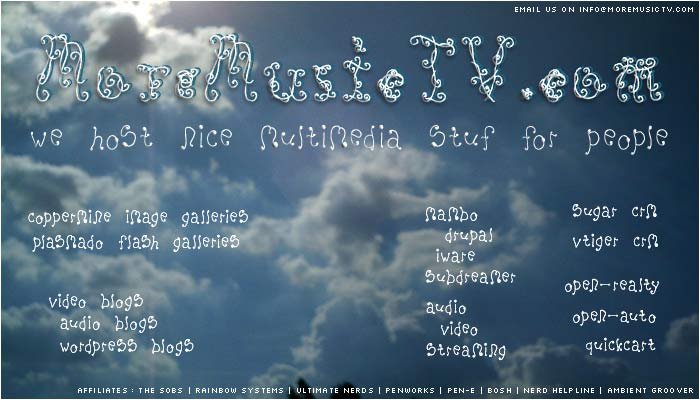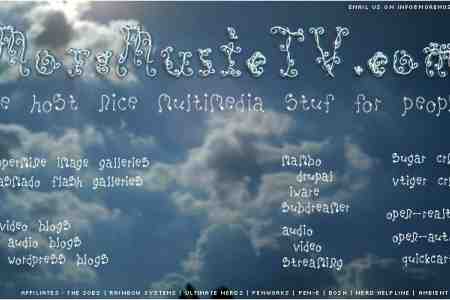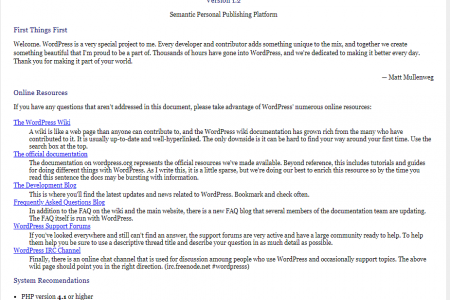Internet People

Or 'how we got here and where we might go next' ...
This is an autobiographical take on the history of the internet from one person's ex-musician PoV. I think this standpoint is probably quite representative of how internet culture came to be what it is today.
The beginning
In the beginning there was dial-up. But actually that wasn't the beginning at all. The beginning probably started in real terms when all the musicians discovered synthesisers, then sequencers, then computers. That was between late 70s to early 80s. Someone brought a ZX 81 to my house in 1981 and we watched it play pong. I was using computers in assorted jobs by '87, but these were MS-DOS, workhorse machines without much creativity. Creative computing really arrived when music programming took off in mid 90s, stuff like Atari 1040 and Steinberg, Cubase, Cakewalk. I think the first 'serious' software programming I saw was C-Lab, in about 1995, on a Win98 whitebox PC. Musicians came to our backroom micro-studio because we had a Tascam 8-track and could 'stripe a track' to run in sync with software click-tracks. This meant you could sing or play real instruments along with programmed electronica. I was still a songwriter then, but always trying to work with a hybrid electronic/real context. (I failed, but that's another story not for here.) What IS relevant is that a music programming backstory is shared with probably hundreds of thousands of other people my generation.
I think musicians have had a huge amount to do with how the internet got built, and the culture it got built around. The major tech pivot that we all did, at first because of music itself, then as a consequence of moving on from music, was what really helped the culture of tech. Hard to put a date on that but for most of the early Gen Xers that this is about, it was around late 90s. We began to gravitate to tech, when we knew the music was finally over.
The world got flat
Thomas Freidman's book The World is Flat documented the change well. I wasn't in the academic fold then, but I found a video in early 2005 of Freidman doing a talk on the MIT World website. That video, along with Bruce Sterling's talk on spimes and blobjects delivered from I think Frankfurt University, told me I could join 'academic tech' and still build the stuff we'd all been doing for the past few years. And I didn't need to have a personality change, I could stay alternative, which was important. I think a lot of us were curious about how much we knew, we were all completely self taught, often alone, relying on script libraries, forums and blogposts for our knowledge and problem solving. As this tech pivot change became more explicit - public, if you want - the attraction to find out who was in these communities of alt-tech was strong. Curiosity drove us to want to find out who each other was. Universities that offered innovative courses were one such possibility to do both, find out how much we knew, and who else knew what we knew. Joining a web-tech degree programme at that time was actually life changing for me, and probably for a lot of other people. It was a way to join the normal world with the very alternative skills we had. We didn't need to sell out. The normal world had come to us.
Scripting and Google hacking
In the early days we had dial-up connectivity so we got free basic hosting, it was really common for companies (Virgin, then Pipex in our case) to offer some online drive space if you signed up for their internet deal. We now call that 'the cloud', a ridiculous commercialised hype-up of a really mundane free thing that had been going on 30+ years. This is how I began, using their server space to host stylesheets, RSS 2.0 files and images for my blogger site, then later the first static websites I built. My Macromedia Flash MX site that I built for my solo songwriting provided me with several paying clients who wanted that kind of site for their business.
I suppose I was lucky as my partner at the time was also in this loop and he gravitated to systems admin and whitebox PC building, whereas I gravitated to coding, scripting and multimedia. That meant I could build CMS or static html websites with more advanced CSS styling, and make CD-Roms and Flash animated websites for his clients, and he could build me computers, and later, our own server. Win-win, at least for a time. I made use of anything I could find to learn. I used HotScripts like a demon, implementing many CMS and single function scripts, hacking them, designing them up, reconfiguring them, and subsequently learning a lot about PHP/MySQL in the process. I also learned Flash, Video editing and Photoshop. This kind of experience is give-or-take the same thing that happened to a lot of people. Some where better than others, and some were very good indeed. Us who were lower life forms to the tech gods just hung around and learned from them, much as the rock business had worked before, super innovators, midstream achievers, and then everybody else. The money had mostly left the rock business anyway, and certainly for our generation it wasn't possible to make a future there anymore. There was a saying at the time: the brains have left the (music) business. They'd all gone to tech, that was so full of money and opportunity. Anyone who had skills could make money. I made some as a freelancer. I made a lot more once I joined academia.
Any university that was offering media degrees - not media studies, that was theory (aka 'book learning'), but media development - multimedia - needed people who had skills like mine. I've only ever been a Google hacker and quite good with information architecture, but I'd made money building websites, Flash apps, CD Roms for SMEs, so becoming a multimedia lecturer was a kind of foregone conclusion. My past as an autodidact meant I could adapt fairly quickly. My web and multimedia project work meant I could work with students on real webdev or app dev projects (actual practical ability in this 'SME' area can be in very short supply amongst computing faculty). I'm curious, so I just kept going, learning all kinds of stuff (see bottom of this article). None of this is very special though, a lot of techy people can do all this, but it means I get it, what people are talking about in tech, even much harder tech than I could ever take part in. I'm technically literate, without actually being a serious coder.
Internet people
I think the kinds of work I've done will be replicated by countless other hacker devs across the internet. All the SME projects, the websites, the CMS choices, the culture of forum knowledge sharing, the best practice, the quick n dirty practice, just the ways of doing things. It's all been made by mixtures of people like me, some worse than me, some much better than me. And I'd love to know how many of those were or are musicians. I've also known ex journalists, illustrators, photographers and amateur film makers who moved into webdev and media dev. Game developer communities are full of these people. I think the closer you get to working for enterprise system tech, the more normal you become, or I think that's possible, it's like any other job. The more you have to fit in and be compliant and company orientated, the more you get sucked into the machine. But if you stayed as a hacker, worked freelance, you made some money, you had some clients, you tried to keep it real, then you aren't one of those enterprise people, you're different. This rule applies to people who are twenty-five as much as people who are fifty-five or more.
We own the internet, the internet does not belong to the big companies. We need to take it back. I think this is what makes the Fediverse good, solid, reliable. It's filled with a lot of people who haven't totally succumbed to the machine of normal working life. The Mastodon community has a lot of professionals in it, don't get me wrong, academics, scientists, technical communities all with proper jobs and careers. But they wouldn't be on Mastodon if they didn't hold some of these views or some similar histories. Apps like Lemmy probably have a higher proportion of more radical tech minds, you can see it in the conversations. So it's a fine line between being on Mastodon (or other Fediverse social apps like Firefish) because you're community orientated, and being there because you're rebelling.
I think the Fediverse model is a part of the solution to a better internet, and as it develops it will adapt to being something a lot more people use. Institutions and businesses are already seeing that open source federated social communications and knowledge forums are a solution to an increasingly precarious proprietary monopoly owned communication and knowledge network. The global monopolised network idea doesn't work anymore - digital sovereignty has put paid to that.
For internet futures
People are increasingly frustrated with private communication apps for tech support, or commercialised video for tutorial support. They are beginning to miss 'old forms' like forums, wikis and written text learning. People are even encouraging use of old tech to create a better internet experience. This flies in the face of much media attention about new technologies, apps, services and smart tech. It's the exact opposite. Is it Luddism? No, it's very techy, this approach. It's DIY hackability and pirate community. It's community and care without people being the product, to break the walled garden prisons of user surveillance data suck. I believe this approach will only increase to deal with the intense pressure now being exerted by big tech to capture and sell our data or force us to pay to retain our privacy.
The problem is that we are entering a time and place where it is almost impossible to keep up with the technological processes that are now becoming significant influencing factors governing our day to day life, ergo 'AI'. Data analysts are magicians, chatGPT design processes are mysticism. We are powerless in the face of how these technologies will be implemented at scale throughout the layers of the knowledge systems and services we have relied upon for more than thirty years. Opinion ranges from embrace or die to fight to the very end but my own view is to learn as much as you can about how stuff works, just like we all did to build the internet in the first place. Use that knowledge to create new ways of doing things that circumnavigate the platform monopolies - so developing/using open source AI, running your own desktop AI, being fully aware of the massive ethical and bias problems, and subsequent warping of output. Always look for real sources, not LLM trained results. And stay pirate.
Images
MoreMusicTV.com was an idea from around 2004, to host all kinds of multimedia, my test work plus other files that people needed hosting. It was more useful to us as a showcase than it ever was for hosting other people's work, I think most people still didn't realise they could directly benefit from files being hosted 'in the cloud'.

Image Caption: MoreMusicTV intro back gif (click to enlarge)
The Nerd Helpline Vlog 'kubrick header' image for the video blog I ran for about 18 months around 2004/5 on WordPress 1.2, my first real WP implementation. My ex partner did the video appearances, I did the video editing with Adobe Premier 6.5 and compression using QuickTime Pro and 3ivx codec. That meant that files normally around 50mb (too big for those days bandwidth) could be compressed to 15mb or less, and keep the quality. The method was taught to me via emails I exchanged with one of the guys who made Rocketboom.

Image Caption: The NerdHelpline Vlog header image (click to enlarge)
WordPress 1.2. Get that: A semantic personal publishing platform.

Image Caption: Wordpress 1.2 readme screenshot (click to enlarge)
Technical footnotes
The record of an autodidact that helped build the internet. I write this down so that people starting out, no matter what age, see what it takes to learn the languages and software of the internet. This is as true now as it was back then, only the names and languages change. But knowing all this, I do not consider myself an actual coder because multimedia is different, we are general specialists, yes a kind of jack-of-all-trades. But the great advantage is that we get it, this stuff.
From late 90s to 2005:
- Photoshop v 3-v5
- Adobe Premier Pro 6.5
- Moved rapidly from Frontpage to Netscape to Web Weaver
- I later moved Macromedia Dreamweaver 4.
- Started using Ace HTML and Win FTP, or WinSCP
- Tried to learn XSLT (failed but liked the idea of styling XML)
- Implemented Movable Type, eZ Publish, TYPO3, Open Realty, Coppermine, Quickcart, Sugar and vTiger CRM, Drupal, and many other smaller PHP flat file or MySQL systems.
- I ran video blogs, after watching Rocketboom for a while. I contacted their tech people via email to get info on how to do it and learned about 3ivx codec for QuickTime mov files. I used Adobe Premier 6.5 on a pretty low powered whitebox.
- I used Wordpress, initially early on testing Wordpress 1.0 but moving to themed (Kubrick!) Wordpress 1.2 I could adapt and design up better.
- I learned CSS using my (pre Google owned) Blogger site cos it had completely customisable stand alone CSS, plus you could create and run your own RSS if you looked at how their ATOM was made and had somewhere to host it.
- I taught myself RSS 2.0
From 2007 to 2015
- Ive built several reasonable ExpressionEngine sites, fancy custom WordPress sites and more complex Drupal builds.
- I worked with various video editors, audio editors, image editors.
- I can hack and botch JavaScript
- I taught myself Sassy CSS
- I implemented Node and Ruby so I know what an npm package or ruby gem is
- I've worked with a Grunt workflow
- I can do basic Git
- I can work at cmd line
- I can search/ replace sql in MySQL tables!
- I can make child themes and functions php files for custom WordPress
- I can implement jQuery libraries
- I also comment my hacky shitty code
Nowadays I mess about with Grav and Jekyll, soon to learn Eleventy and Hugo. It's a useful side hussle, though these days you don't make any money in webdev unless you're enterprise standard front/back/fullstack. I'm nowhere near any of that and too old to care. But like many others, I can understand what's going on.